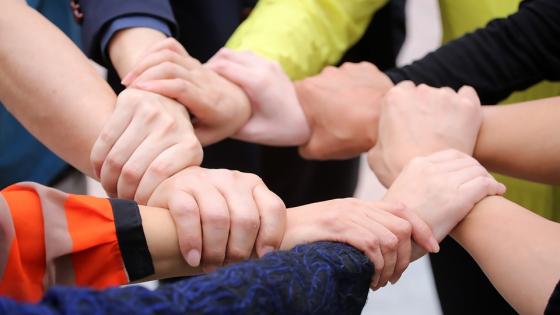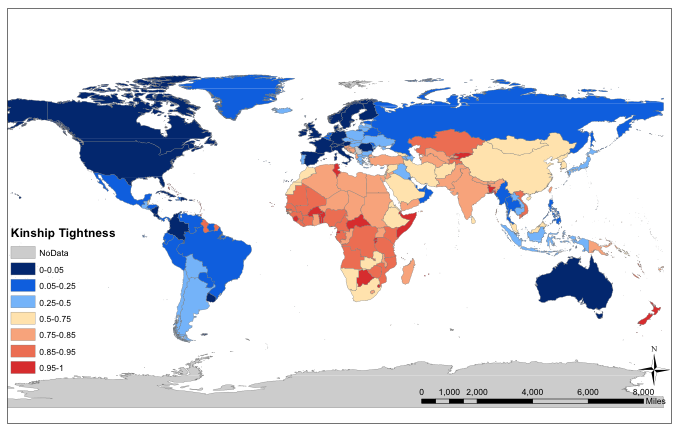Social dilemmas – situations that are characterised by a conflict between collective and individual interests – are pervasive. Whether in the context of free-riding on others, cheating on taxes, stealing, selling a damaged product, or behaving aggressively, socially beneficial outcomes often require people to refrain from pursuing their self-interest for the benefit of others, or to benefit society as a whole. Because the general problem of cooperation is so pervasive, it has been called “the fundamental problem of human existence” (Greene 2014). We can argue that societies have built their entire social organisation to solve this problem (Henrich, forthcoming).
Cultural heterogeneity in cooperation and enforcement
Many researchers (Hofstede 1984, Shweder 1991, Markus and Kitayama 1991, Triandis 1995, Nisbett 2003) point out variation in these societal structures, because they are induced by differences in kinship systems:
- Some societies, they argue, consist of many disjoint tightly structured, cohesive in-groups. These groups form dense social kinship networks. Here, a social group is the basic unit of society. People cooperate effectively with in-group members, yet everybody outside the in-group is considered to be an enemy. Society is divided into ‘us’ and ‘them’.
- Elsewhere, in contrast, the basic unit of society is the individual. People in these societies have weaker personal relationships, but also engage in mutually beneficial interactions with members of the society at large because they have less-pronounced in-group versus out-group feelings.
Economists, psychologists, and anthropologists have long worked towards an understanding of which mechanisms sustain and enforce cooperative behaviour. If societies exhibit different scopes of cooperation, however, then they might also employ different tools to incentivise people to behave cooperatively. Economists typically emphasise institutions and social norms as tools, but psychologists, anthropologists, and evolutionary human biologists have recently begun to argue that some psychological and biological traits have also evolved specifically to support effective cooperation. This implies that cross-cultural variation reflects different needs for psychological punishment devices – in effect, they are our ‘internal police officers’ (Haidt 2012, Greene 2014, Norenzayan et al. 2016, Henrich 2015, forthcoming).
Compare in-groups that depend on repeated interaction to those that largely rely on impersonal exchange. Maintaining cooperation within in-groups that depend on repeated interaction would require a different set of institutions, psychological and biological adaptations to those that regulate behaviour in impersonal-exchange societies.
According to the theoretical literature, the key mechanisms for sustaining cooperation in impersonal-exchange societies are:
- ‘Moralising’ gods. These gods are actively concerned with and supportive of human morality (Norenzayan 2013)
- Universal moral values. Compare this with ‘tribal’ values, such as in-group loyalty (Shweder 1999, Haidt 2012, Greene 2014).
- Emotions of internal guilt. As distinct from external shame and associated physiological responses (Dodds 1957, Benedict 1967, Bowles and Gintis 2003, Henrich 2017).
On the other hand, the hypothesis is that enforcing behaviour in a ‘kith and kin’-based society requires:
- Strong local institutions
- Tight social norms (also, values related to norm adherence)
- External shaming of wrongdoing
A new measure of cultural variation in historical kinship systems
As a result, social scientists have long theorised that social structures, cooperation patterns and psychological, biological and institutional variables coevolve. In recent research, I conduct an empirical analysis of these theories (Enke 2017).
According to cultural anthropologists, historical kinship systems are the most important determinant of social organisation. Therefore, I use a proxy for a society’s historical social organisation by exploiting ethnographic information about their structure. Kinship describes patterns of relatedness through mating and birth. This concept is much broader than ‘Western' notions of the nuclear family.
My measure of the historical tightness of kinship systems is based on information in the Ethnographic Atlas, an ethnographic dataset on the historical structure of 1,311 pre-industrial ethnicities. Figure 1 shows the distribution of ancestral kinship tightness. Using this measure of the historical tightness of kinship systems, I study the relationship between kinship systems, cooperation patterns, and the cultural enforcement devices that anthropologists and psychologists emphasise.
Figure 1 The cross-country variation in ancestral kinship tightness
Source: Ethnographic Atlas.
The relationship between kinship tightness, cooperation, and trust
I find that ancestral kinship tightness is indeed strongly predictive of cultural variation in cooperation and trust patterns. In societies that historically had tight kinship systems, people exhibited strong in-group favouritism. They cooperated poorly in experimental games with out-group members, and even cheated them, but assigned high importance to helping in-group members in need. Similarly, they have shown high trust in in-group members such as neighbours, but low trust in strangers and people in general. In contrast, societies with loose ancestral kinship ties cooperate effectively and trust broadly, yet do not place special emphasis on helping in-group members in need.
Psychological, biological, and institutional enforcement devices
If kinship tightness is associated with fundamentally different cooperation systems, then – according to the psychological and anthropological theories – it should also be related to the structure of psychological, biological, and institutional enforcement devices. That is, religious beliefs, moral values, shame versus guilt, formal institutions, and social norms should vary as predicted by theory. I establish that this is the case. In particular, I find that societies with loose ancestral kinship ties appear to regulate behaviour through belief in a moralising god, universal moral values that emphasise concepts as individual harm, rights and justice, internal feelings of guilt, and ‘global’ institutions that supersede separate in-groups.
In contrast, societies with a tight kinship structure seem to enforce cooperative behaviour through ‘communal'' or tribal moral values such as in-group loyalty, emotions of external shame, and strong local institutions and social norms – alongside values that mandate norm-adherence and behaving properly.
So the structure of enforcement devices closely corresponds to observed cooperation and trust patterns. This suggests a coevolution of kinship structures, cooperation regimes, institutions, and cultural traits. In particular, punishment in tight kinship societies is largely personal and direct, while in loose kinship societies it is often anonymous and relies on ‘psychological police officers'. The apparently puzzling amount of cultural variation in what appears to be unrelated psychological and biological phenomena can be understood through the lens of coevolution for the purpose of ensuring effective cooperation.
References
Benedict, R (1967), The Chrysanthemum and the Sword: Patterns of Japanese Culture, Houghton Mifflin Harcourt.
Bowles, S and H Gintis (2003), “Origins of Human Cooperation”, in P Hammerstein (ed.), The Genetic and Cultural Evolution of Cooperation, MIT Press.
Dodds, E R (1951), The Greeks and the Irrational, University of California Press.
Enke, B (2017) “Kinship Systems, Cooperation and the Evolution of Culture”, NBER Working Paper No. 23499.
Greene, J (2014), Moral Tribes: Emotion, Reason and the Gap Between Us and Them, Atlantic Books.
Haidt, J (2012), The Righteous Mind: Why Good People are Divided by Politics and Religion, Vintage.
Henrich, J (2015), The Secret of Our Success: How Culture is Driving Human Evolution, Domesticating Our Species, and Making Us Smarter, Princeton University Press.
Henrich, J (forthcoming), WEIRD People: How Westerners became Individualistic, Self-Obsessed, Guilt-Ridden, Analytic, Patient, Principled and Prosperous, Princeton University Press.
Hofstede, G (1980), Culture’s Consequences: International Differences in Work-Related Values, Vol. 5, Sage.
Markus, H R and S Kitayama (1991), “Culture and the Self: Implications for Cognition, Emotion, and Motivation”, Psychological Review 98(2): 224-253.
Nisbett, R (2003), The Geography of Thought: How Asians and Westerners Think Differently, Simon and Schuster.
Norenzayan, A (2013), Big Gods: How Religion Transformed Cooperation and Conflict, Princeton University Press.
Norenzayan, A, A F Shariff, W M Gervais, A K Willard, R A McNamara, E Slingerland, and J Henrich (2016), “The Cultural Evolution of Prosocial Religions”, Behavioral and Brain Sciences 39(e1).
Shweder, R A (1991), Thinking Through Cultures: Expeditions in Cultural Psychology, Harvard University Press.
Shweder, R A (1999), “Why Cultural Psychology?”, Ethos 27(1): 62–73.
Triandis, H C (1995), Individualism & Collectivism, Westview Press.




